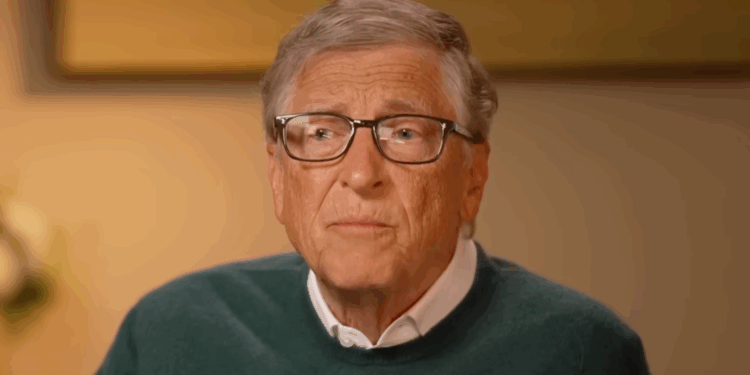In recent days, the tech magnate has made headlines by distancing himself from the climate apocalypse fan club. Many analysts have praised the supposed return to sanity of the man who forever changed computing in the last century; however, there’s a catch. Bill Gates hasn’t suddenly become sensible — he’s simply realized that Greta Thunberg’s apocalyptic style, the same one he has embraced since publishing his book How to Avoid a Climate Disaster in 2021, is undermining his own multi-billion-dollar tech investments.
Gates’s shift in public stance can’t be fully understood without paying attention to a fact that went largely unnoticed last March. At that time, Breakthrough Energy Ventures (BEV) — the climate organization founded by Gates — carried out a major downsizing plan across all its operations, including its entire EU division, the staff working on U.S. public policy, and a large portion of its workforce dedicated to international partnerships with environmental NGOs. Once again, the key is to follow the money: This restructuring was a direct consequence of Donald Trump’s arrival at the White House and his effort to shut off the flow of government funds to environmental policies from which numerous companies, including BEV, had benefited directly or indirectly.
This organization had built much of its success on climate-apocalyptic pressure campaigns aimed at convincing governments to increase funding for emissions-reduction projects and clean energy promotion. With the loss of U.S. government support, the organization found itself without a future — unless it pivoted to private investment, which is precisely what it’s doing now. But once the enormous structure built around the public sector loses that foundation, it becomes an absurd expense.
By 2022, BEV had made over 100 investments in startups dedicated exclusively to reducing greenhouse gas emissions. At that time, the first internal disagreements arose during a company summit. While many of its leaders insisted on the “time is running out” message to save the planet, Eric Toone, a member of the investment committee, proposed “accepting reality” — acknowledging that the projected reductions are impossible in the short term — and opened the door to a possible reorientation of BEV’s investments.
Thanks to Trump’s decisive push to redirect government funds, it appears BEV has ultimately sided with Toone: Gates now wants to distance himself from the apocalyptic hysteria of environmental NGOs and redirect the narrative toward the need to adapt to climate change. In other words, it’s now more profitable for him to emphasize innovation and new clean technologies than to keep urging governments and citizens to curb consumption. This new approach favors a long-term investment market — and, of course, directly benefits his new tech holdings. Gates no longer aims to make money by preventing temperature rise, but rather by encouraging private investment in adaptation initiatives, ensuring that everything continues to operate normally when it happens.
Currently, the Microsoft founder is involved through TerraPower in the development of next-generation nuclear reactors, such as liquid sodium reactors, and is also engaged in energy transition projects that include infrastructure improvements, data centers, and other innovations. Through BEV, he has begun investing heavily in clean steel companies like Boston Metal, electrolysis firms like Electric Hydrogen, and battery recycling ventures such as Redwood Materials. Gates is also putting money into companies that extract raw materials critical to clean technologies, such as KoBold Metals, which seeks minerals — copper, nickel, and lithium — essential for the development of electric vehicles and batteries.
One of Trump’s greatest achievements, therefore, has been dismantling the network of businesses and public-fund exploitation that governments, institutions, NGOs, foundations, and private interests had built around the climate apocalypse. With the government funding tap turned off, all Gates has done is move to another arena where there’s still money to be made — namely, private innovation. It’s not that he no longer believes in urgent public policies and strict, immediate regulations; rather, he has simply shifted his business elsewhere — toward investing in private adaptation solutions.
The move is clever because, once public money is removed from the equation, Gates has realized that his role as a climate-change prophet attracts only activists, not investors. So he has shamelessly shed that role, abandoning his mask as a climate priest advocating policies that impoverish the Western middle class, and has donned the robes of a prudent investor — someone focused on making money and generating profits for others.
In his blog, where he explained his new stance, he claims to have reached this conclusion after realizing that limiting temperature rise through restrictions is nearly impossible within a reasonable timeframe. However, the truth is that if Joe Biden’s environmental policies had remained dominant, it’s highly unlikely he would have reached that conclusion. It’s also fair to note that it’s not only Trump who has disrupted the network of interests and businesses surrounding the climate doomsayers; across the West, right-wing political movements are gaining ground in that direction, accelerating a significant shift in public opinion. This is happening as the consequences of green public policies begin to hit — and hit hard — the household budgets not of the wealthy, but of the middle and working classes.
Thus, Bill Gates has swiftly gone from warning that we had less than 30 years to avoid an “irreversible disaster” and that “there is no plan B,” to admitting that, in reality, with climate change most of the world will continue living exactly the same — and that it won’t cause any cataclysm, especially if the public and private sectors in the West redirect their environmental strategies toward technological adaptation to rising temperatures and safeguarding citizens’ well-being.
With this change of heart, billionaire Bill Gates has come to fulfill the old adage: the house always wins.
Translated from Spanish by Joel Dalmau.
READ MORE:








![Donald Trump Slams Chicago Leaders After Train Attack Leaves Woman Critically Burned [WATCH]](https://www.right2024.com/wp-content/uploads/2025/11/Trump-Torches-Powell-at-Investment-Forum-Presses-Scott-Bessent-to-350x250.jpg)


![Texas Trucker Busted with 23 Illegals Stuffed into the Cab of His Big Rig [WATCH]](https://www.right2024.com/wp-content/uploads/2025/12/Texas-Trucker-Busted-with-23-Illegals-Stuffed-into-the-Cab-350x250.jpg)





